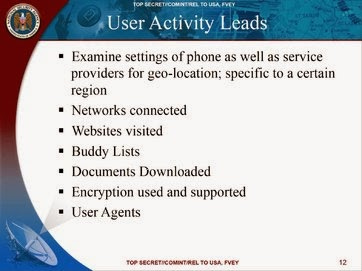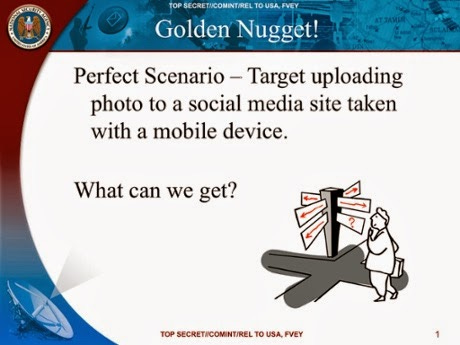NSA uses "leaky" smartphone apps like 'Angry Birds' to spy on users' private information

The National Security Agency and its UK counterpart GCHQ have been developing capabilities to take advantage of "leaky" smartphone apps, such as the wildly popular Angry Birds game, that transmit users' private information across the internet, according to top secret documents.
The data pouring onto communication networks from the new generation of iPhone and Android apps ranges from phone model and screen size to personal details such as age, gender and location. Some apps, the documents state, can share users' most sensitive information such as sexual orientation – and one app recorded in the material even sends specific sexual preferences such as whether or not the user may be a swinger.
Many smartphone owners will be unaware of the full extent this information is being shared across the internet, and even the most sophisticated would be unlikely to realize that all of it is available for the spy agencies to collect.
Dozens of classified documents, provided to the Guardian by whistleblower Edward Snowden and reported in partnership with the New York Times and ProPublica, detail the NSA and GCHQ efforts to piggyback on this commercial data collection for their own purposes.
Exploiting phone information and location is a high-priority effort for the intelligence agencies, as terrorists and other intelligence targets make substantial use of phones in planning and carrying out their activities, for example by using phones as triggering devices in conflict zones. The NSA has cumulatively spent more than $1bn in its phone targeting efforts.
The disclosures reveal easy it is to spy on smartphones.
One slide from a May 2010 NSA presentation on getting data from smartphones – breathlessly titled "Golden Nugget!" – sets out the agency's "perfect scenario": "Target uploading photo to a social media site taken with a mobile device. What can we get?"

The question is answered in the notes to the slide: from that event alone, the agency said it could obtain a "possible image", email selector, phone, buddy lists, and "a host of other social working data as well as location".
In practice, most major social media sites, such as Facebook and Twitter, strip photos of identifying location metadata (known as EXIF data) before publication. However, depending on when this is done during upload, such data may still, briefly, be available for collection by the agencies as it travels across the networks.
Depending on what profile information a user had supplied, the documents suggested, the agency would be able to collect almost every key detail of a user's life: including home country, current location (through geolocation), age, gender, zip code, martial status – options included "single", "married", "divorced", "swinger" and more – income, ethnicity, sexual orientation, education level, and number of children.
http://www.theguardian.com/world/2014/jan/27/nsa-gchq-smartphone-app-angry-birds-personal-data
http://www.nytimes.com/2014/01/28/world/spy-agencies-scour-phone-apps-for-personal-data.html?_r=0
FAQ about NSA’s interest in Angry Birds and other ‘leaky apps’
http://www.propublica.org/article/faq-about-nsas-interest-in-angry-birds-and-other-leaky-apps
EPA to track (spy) keywords about the flu on Twitter:
A new solicitation on the government’s Federal Business Opportunities website involves a five-year Environmental Protection Agency (EPA) study trolling Twitter with algorithms for keywords about the stomach flu:
The Office of Research and Development (ORD), National Exposure Research Laboratory (NERL) located in Cincinnati, OH is requesting a BPA to purchase Twitter messages based on search criteria EPA provide the vendor. The information gather will then be used to compile cause and affect analyses for research. The following example search terms are considered evidence of AGI:
Stomach flu, stomach bug, stomach ache, nausea, vomiting, and diarrhea.
The solicitation document goes on to say that these Twitter messages, “will be evaluated by U.S. EPA human health specialists to determine if they are indicative of AGI.”
Because the agency used the phrase “human health specialists” — plural with an ‘s’ — that means that multiple people over at the EPA will be employed to sit around and analyze (spy) Tweets with the words “vomiting” and “diarrhea” in them.
It isn’t going to be cheap, either — as Elizabeth Harrington at The Washington Free Beacon points out: Similar projects have cost millions.
The National Institutes of Health recently allotted $5 million for several studies of Facebook, Instagram, and Twitter for research on drug abuse over a three-year period. The NIH also awarded a one-year $82,800 grant to research how to use Twitter for surveillance on depressed people.
No word on why the EPA is conducting this study instead of the CDC (which already tracks the flu on the agency’s “Flu Activity & Surveillance” webpage) or the Department of Health and Human Services which runs the government’s official Flu.gov website (tagline: “It’s not too late to vaccinate!”)
https://www.fbo.gov/index?s=opportunity&mode=form&id=7fa52123ab6a973ca2804444165e82d3&tab=core&tabmode=list&
http://www.thedailysheeple.com/more-govt-data-mining-epa-to-track-keywords-about-the-flu-on-twitter_012014
Senator Schumer wants $10 million to buy GPS devices to track (spy) autistic children:
The federal government would pay for GPS tracking devices for autistic children under legislation proposed Sunday by Sen. Chuck Schumer, D-N.Y., and named for a New York City boy who wandered away from his school three months ago and was found dead in a city river.
"Avonte's Law," named for 14-year-old Avonte Oquendo, would provide $10 million to pay for the high-tech device that could be worn on the wrist, kept in a wallet or sewn into clothing.
The program would resemble one that Schumer said has successfully kept track of people with Alzheimer's disease using a computer-programmed alert system. That program signals police departments when someone wearing the device leaves a place where they are supposed to be.
Each device costs about $85, plus a few dollars in monthly fees, the senator said, adding that hundreds of families with autistic children already have used privately funded tracking devices.
http://www.syracuse.com/news/index.ssf/2014/01/schumer_seeks_10_million_to_buy_gps_devices_to_track_autistic_children.html


